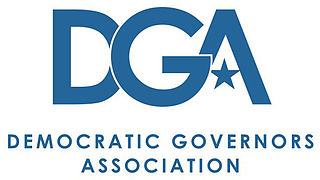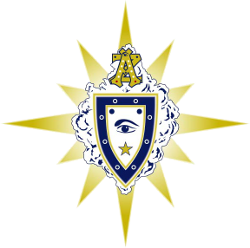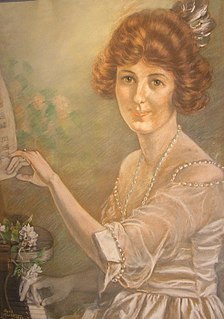
Fannie Brown Patrick (August 29, 1864 - October 8, 1939) was a musician and leader in civic and social affairs.

Fannie Brown Patrick (August 29, 1864 - October 8, 1939) was a musician and leader in civic and social affairs.
Fannie Brown was born in Fairfield, Iowa, on August 29, 1864, the daughter of Isaac Harrington Brown (1822-1901) and Sarah Ellen Fee (1826-1901). She had two siblings: Fred P. Brown (1867-1950) and Prudence M. Harrington (1870-1918). [1] [2]
Fannie Brown Patrick was a music teacher and one of the organizers of the Nevada Musical Club and acted on several occasions as chairman of music week. [1] [3]
She was active in civic work: she was the chairman of the Council of Education of the YWCA; she was past president of the State Federation of Women's Clubs of Nevada; she was trustee and secretary of Southside Irrigating Canal Co. [1]

She was a charter member of the Twentieth Century Club (for which she served several time as secretary and was the club parliamentarian for 20 years) and the State Farm Bureau, and was president of the Hillcrest Chapter of Delphian Society. [1] [2] [3]
She was instrumental in founding a number of Reno institutions. Prominent in politics of the State, Patrick was active for many years in affairs of the Democratic party and she was member of the National Committee woman of Nevada Democratic Party. [2]
She was a member of the Daughters of the American Revolution, the Trinity Episcopal Church and the Guild Society and other groups. [2]
With her husband, Patrick operated the Patrick ranch near the south city limits of Reno; in the 1930s the land was subdivided and added to the city and Patrick retained the property where their home was located. [3]
She was prominent in the Women's suffrage movement in Nevada. [3]
Fannie Brown Patrick lived at Fremont, Nebraska and Wood River, Nebraska, and moved to Reno, Nevada in 1902. [1] [2]
Fannie Brown married Frank Goodwill Patrick (1854-1922) and they had two children: Octa Maude Patrick (1889-1889) and Lloyd B. Patrick (1892-1967). [1]
She died on October 8, 1939, and is buried at Ridge Cemetery, Fremont, in the family plot. [2]

John Charles Frémont or Fremont was an American explorer, military officer, and politician. He was a U.S. Senator from California, and in 1856 was the first Republican nominee for President of the United States. He was an opponent of slavery.

The Daughters of the American Revolution (DAR) is a lineage-based membership service organization for women who are directly descended from a person involved in the United States' efforts towards independence. A non-profit group, they promote historic preservation, education, and patriotism. The organization's membership is limited to direct lineal descendants of soldiers or others of the Revolutionary period who aided the cause of independence; applicants must have reached 18 years of age and are reviewed at the chapter level for admission. The DAR has over 185,000 current members in the United States and other countries. Its motto is "God, Home, and Country".

Alan Harvey Bible was an American lawyer and politician. A member of the Democratic Party, he served as a United States Senator from Nevada from 1954 to 1974. He previously served as Attorney General of Nevada from 1942 to 1950.
Frank J. Fahrenkopf Jr. is an American attorney, political executive, and lobbyist who was chairman of the Republican National Committee from 1983 to 1989. Fahrenkopf is co-founder, and currently co-chairman, of the Commission on Presidential Debates, which conducts the United States general election presidential and vice presidential debates. In the private sector, Fahrenkopf most recently served as the American Gaming Association's first president, and retired from the position in 2013.

The Democratic Governors Association (DGA) is a Washington, D.C. based 527 organization founded in 1983, consisting of U.S. state and territorial governors affiliated with the Democratic Party. The mission of the organization is to provide party support to the election and re-election of Democratic gubernatorial candidates. The DGA's Republican counterpart is the Republican Governors Association. The DGA is not directly affiliated with the non-partisan National Governors Association. Noam Lee is currently the Executive Director of the DGA.

The General Federation of Women's Clubs (GFWC), founded in 1890 during the Progressive Movement, is a federation of over 3,000 women's clubs in the United States which promote civic improvements through volunteer service. Many of its activities and service projects are done independently by local clubs through their communities or GFWC's national partnerships. GFWC maintains nearly 70,000 members throughout the United States and internationally. GFWC remains one of the world's largest and oldest nonpartisan, nondenominational, women's volunteer service organizations. The GFWC headquarters is located in Washington, D.C.

Ruth Baird Bryan Leavitt Owen Rohde, also known as Ruth Bryan Owen, was elected to two terms in the U.S. House of Representatives and was the first woman appointed as a United States ambassador. The daughter of attorneys William Jennings Bryan and Mary E. Baird, she was a Democrat, who in 1929 was elected from Florida's 4th district as Florida's first female U.S. Representative and the second from the South after Alice Mary Robertson. Representative Owen was also the first woman to earn a seat on the U.S. House Committee on Foreign Affairs. She campaigned for prohibition.
The Department of the Missouri was a command echelon of the United States Army in the 19th century and a sub division of the Military Division of the Missouri that functioned through the Indian Wars.

The Nevada congressional elections of 2006 took place on November 7, 2006 when each of the state's three congressional districts elected a representative to the United States House of Representatives. Although President George W. Bush captured the state in both the 2000 and 2004 elections, he did so with a very slim margin. Nevada was considered a battleground state due to the close victory margins.

Alpha Zeta (ΑΖ) is a professional fraternity for students and industry professionals in the agriculture and natural resources fields. Founded in 1897 at Ohio State University, Alpha Zeta is the first and oldest collegiate society for agriculture. Today, Alpha Zeta has over 125,000 alumni and 1,000 student members at 30 universities.
John Gale is from North Platte, Nebraska, and served as the 26th Secretary of State of Nebraska from 2000 until 2019. He is a member of the Republican Party.

Catherine Marie Cortez Masto is an American lawyer and politician who is the senior United States senator from Nevada since 2017. A member of the Democratic Party, she was the 32nd attorney general of Nevada from 2007 to 2015.
The Secretary of State of Delaware is the head of the Department of State of the U.S. state of Delaware. The Department is in charge of a wide variety of public and governmental services, and is divided into the following divisions:

With this motto, “The measure of the worth of an organization to its community, is bound in its ability to embrace opportunities for service” the Twentieth Century Club had its beginning in 1894. Mrs. Walter McNab Miller served as President for an original group of 84 women. The Club's name was chosen to reflect a look forward to the future and the beginning of the new century.

Burt Kay Snyder was a businessman and Oregon state legislator. He was a Republican member of the Oregon House of Representatives for five terms, from 1939 through 1948. His will established the Burt Snyder Educational Foundation for the benefit of students from Lake County, Oregon.
Cyrus Dicks Bell was a journalist, civil rights activist, and civic leader in Omaha, Nebraska. He owned and edited the black newspaper Afro-American Sentinel during the 1890s. He was an outspoken political independent and later in his life became a strong supporter of Democrats. He was a founding member of the state Afro-American League and frequently spoke out against lynchings and about other issues of civil rights.

Vera McKenna Clayton was a prominent music teacher and community member in Santa Cruz from the 1920s to the 1950s.

Fannie L. Forbis Russel was one of the pioneer women of the state of Montana.

Fannie Jean Black was the president of the San Francisco California Club from 1910 to 1912 and the chairman for San Francisco County on Woman's Auxiliary Board for the Panama–Pacific International Exposition in 1915.

Women's suffrage in Nevada began in the late 1860s. Lecturer and suffragist, Laura de Force Gordon, started giving women's suffrage speeches in the state starting in 1867. In 1869, Assemblyman Curtis J. Hillyer introduced a women's suffrage resolution in the Nevada Legislature. He also spoke out on women's rights. Hillyer's resolution passed, but like all proposed amendments to the state constitution, must pass one more time and then go out to a voter referendum. In 1870, Nevada held its first women's suffrage convention in Battle Mountain Station. In the late 1880s, women gained the right to run for school offices and the next year several women are elected to office. A few suffrage associations were formed in the mid 1890s, with a state group operating a few women's suffrage conventions. However, after 1899, most suffrage work slowed down or stopped altogether. In 1911, the Nevada Equal Franchise Society (NEFS) was formed. Attorney Felice Cohn wrote a women's suffrage resolution that was accepted and passed the Nevada Legislature. The resolution passed again in 1913 and will go out to the voters on November 3, 1914. Suffragists in the state organized heavily for the 1914 vote. Anne Henrietta Martin brought in suffragists and trade unionists from other states to help campaign. Martin and Mabel Vernon traveled around the state in a rented Ford Model T, covering thousands of miles. Suffragists in Nevada visited mining towns and even went down into mines to talk to voters. On November 3, the voters of Nevada voted overwhelmingly for women's suffrage. Even though Nevada women won the vote, they did not stop campaigning for women's suffrage. Nevada suffragists aided other states' campaigns and worked towards securing a federal suffrage amendment. On February 7, 1920, Nevada became the 28th state to ratify the Nineteenth Amendment.